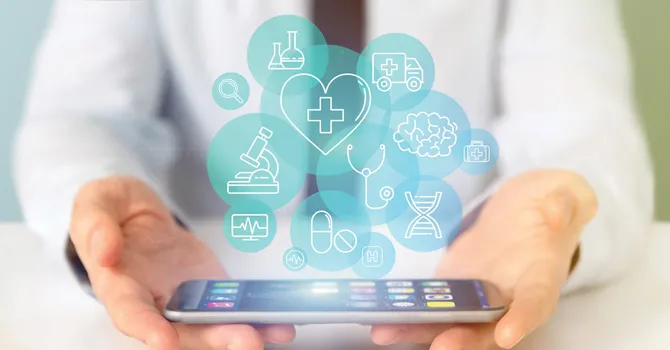The COVID-19 crisis has accelerated the digital transformation in many industries – healthcare and Life Sciences being no exception. How does this impact companies, should they already prepare now for a permanent post COVID-19 “new normal”, and what are the main technologies and capabilities to keep in view? We asked the digital health experts Christian Scheuer, Jan Bordon, and Raf Onclin:
Christian, Jan, Raf: Please tell us, which are the key trends in digital health right now?
Christian: In my opinion, there are three main trends right now: First, we have to be dealing with the current situation – due to the COVID-19 crisis, companies are focused on leveraging digitalization to establish resilience in their operations both promotionally and in supplying their markets. Secondly, because of the pandemic, many companies have learned with their customers that a digitally enabled remote engagement experience is also a good experience. And therefore, lastly, many companies plan for a “new normal” instead of hoping that things will go back to how they were.
Additionally, digital initiatives are no longer “shiny objectives” but about fundamental capabilities that can enable companies to operate across digital and physical engagement: Life Sciences companies have learned that digitalization is more than a stand-alone feature, but rather an integrated infrastructure and capability that supports the company’s core business processes. Let me illustrate this with a simple e-commerce solution: A web shop is of little use if companies don’t connect it to their supply chain management, link it to their customer relationship management (CRM) systems, or tie to external vendors delivering the product sold. Only when properly integrated into a company’s infrastructure, digital web shop or self-service solutions can create many benefits along the customer journey and generate synergies or even compete with the experience we know from the physical world.
And, definitely important: Data is (as we know) king. This long known wisdom still holds true, but many Life Sciences companies still find it difficult to continuously and seamlessly generate data. Now that more and more are focusing on implementing a digital operational infrastructure properly, they also notice that as an additional benefit, it makes it easier to get access to data, for example about customer engagement or buying patterns, because they automatically own it. This will hugely help to continuously improve their customer engagement and operational efficiency.
Raf: Looking at the overall picture, one is safe to say that the pharma and health technology industries have been pressure tested big time during the COVID-19 crisis. One reason for that is that in terms of digitalization, they simply have not been on the same level as other industries like entertainment, banking, or other B2C sectors. During the last year, it paid off to be very adaptive and having digital customer engagement models already in place. The Life Science industry has been lagging behind in this regard, even though digitalization topics like these have always been on the radar. Catching up has been a difficult process, but is happening as we speak at a great speed.
How do these trends translate into challenges companies have to tackle?
Raf: I think in order to become more resilient, build a durable digital infrastructure and monetize data effectively, Life Sciences needs a mind-set shift away from relationships to experiences when it comes to sales. Before, a lot of customer engagement was based on established relationships. This has to be replaced by experiences which consequently will result in changing traditional sales models to models combining digital customer experience with face-to-face or analog customer engagement experiences. To handle this, companies need to broaden their sales teams’ capabilities; the sales rep profile of the future heavily focuses on being able to work in a speedy and agile way and embrace digital infrastructure in their daily operations.
Christian: I agree, establishing these digital sales models will give customers a better purchasing experience. Right now, the way many – not all – Life Sciences companies engage with customers is very reliant on physical contact or a copy of the engagement and content models from the physical world into the digital. In other industries, customers are much more used to having remote or self-service interactions and this is something the healthcare industry has to work on, for two reasons: To allow for a better digitally-enabled customer journey as well as to increase operational efficiency and to allocate effort and resources for maximum return.
Jan: This is also something more and more patients are requesting. During the COVID-19 crisis, telemedicine solutions obviously were much more commonly used than before and found a very high degree of acceptance from patients as well as physicians. Especially with the famously more conservative physicians a shift in mind-set did happen as they realized that the use of digital tools and media enabled them to get valuable information much more effectively. As a result, the industry has to change as well in order to take advantage of this new acceptance and the arising opportunities.
Christian, as a new member of the HealthTech team at Simon-Kucher, what are your focus topics?
Christian: My focus will be on driving digital transformation and capability building for clients so that they can drive customer behavior change by delivering the best experience as well as enabling them to respond quickly to market changes and increase their ability to invest in content and channels that provide the best turn. Because Simon-Kucher has for many years been working with companies in pharma and MedTech and has a top-line and substance driven approach to adding value to clients, I believe Simon-Kucher can help clients take a clear strategic and operational approach to digital in order to deliver real and lasting benefits. This is why I got intrigued to join the company after more than 16 years in industry. From my time in the industry I can see that Simon-Kucher understands the fundamental value drivers of their clients’ business and is keen to deliver advice that can actually make a lasting difference to clients.
After leading global functions within in pharma such as strategy, business development and most recently commercial excellence, where digital transformation played a major part, I believe I can add to the already strong digital and commercial expertise at Simon-Kucher. Working with digital transformation also requires you understand how things work at a practical level inside an organization and I have learned that through a couple of general manager positions in North America and Europe.
In all of yours opinions, which emerging technologies will lead the digital transformation in healthcare?
Christian: There are already established technologies that will help companies transform. The keyword here is integration of systems or platforms. With integration and standardization comes a more robust data infrastructure, which is an enabler to get more out of e. g. business intelligence systems and artificial intelligence. Lastly, with better integration come benefits of engaging customers through their journeys leveraging the full effects of marketing automation.
Jan: In my view, improving integration is for many Life Sciences companies to use the existing in a more efficient way. For instance, lots of companies already have CRM systems, but the way they use the data obtained therein and link it data to other “silos” is not optimal. Getting this right, thus making sure the systems they have are used and the correct indications are drawn from them is the first step. Advanced solutions using Artificial Intelligence or Machine Learning can used on top of that once companies use the amount of data they possess, process and link it correctly. Then and only then they can run other algorithms to get sophisticated insights.
What needs can digital healthcare solutions meet in MedTech and pharma?
Christian: On the provider side, we have seen that COVID-19 has accelerated the use of new technologies, for instance telemedicine which we expect will further accelerate now that providers and patients have become used to it. Integration of telemedicine with accounting systems and electronic patient records will create new opportunities for remote care in terms of monitoring, data generation, pre-operation planning, and post-operation follow up.
On the company side, clinical trials for instance are huge and large investments for companies where digitizing the whole process will engage the patients better and increase efficiency as well as speed. In research, data processing will speed things up, increase capacity and precision when selecting new molecules. We will also experience that with more mature systems and integration, self-service in the promotional and buying processes will result in more satisfactory customer experience as well as higher efficiency.
Lastly, we will see that as companies establish integrated digital platforms, commercialization and customer engagement will become more coherent across customer segments and channels, because they provide transparency across teams, improve collaboration and content development, and dissemination to the right customer segment. The data that continuously is being derived from an integrated commercial platform will enable companies to constantly optimize their customer engagement.
How should companies go about their digital transformation in order to be successful?
Raf: Many Life Sciences companies are already on the right path. However, having accompanied many digital transformations, we recommend four factors that are key to make it happen successfully:
- Companies need to accept that becoming more digital is not a one-off exercise, but rather a journey, and that this change process requires some time.
- Managers should make sure they have a clear road map to prioritize the different transformation steps transparently.
- Don’t reach for the stars: Companies should start with small steps that yield them immediate results. Those can be fine-tuned later on, but the project is much more bound to fail if a company spends two years to build a solution, tries to implement it, and doesn’t get the desired effect.
- Last but not least, Life Sciences companies have to make sure to properly integrate data and IT capabilities very closely into their commercial team and organization.
Thanks everyone for your insights!








